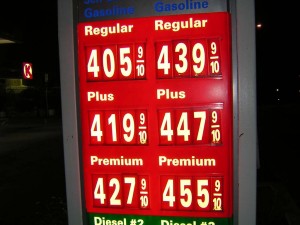Oil prices are approaching a 9-month high raising the specter that gas could again top $4 a gallon in the weeks ahead.
The latest surge follows the early morning agreement to resolve the Greek debt crisis along with Iran’s decision to halt petroleum exports to both Britain and France. Iran currently provides about 18% of the oil used by the European Union but is threatening to further tighten supplies in retaliation for sanctions meant to block its nuclear energy program.
With oil floating around $105 a barrel on Tuesday morning trading, there is also a growing likelihood that gas prices could become a key issue in the upcoming U.S. presidential election, GOP candidate Newt Gingrich tweeting his followers that, “gas prices are unacceptable”.
Petroleum has been moving up for weeks but the latest surge began when Iran announced a halt to exports to Britain and France, both strong supporters of sanctions aimed at getting Iran to back down on what many believe to be a program to develop nuclear weapons.
On Tuesday, the Islamic republic laid out conditions that it says must be followed to avoid further cutbacks to other European countries. Iranian Foreign Ministry spokesman Ramin Mehmanparast told reporters that the Tehran government seeks guarantees of payment, long-term contracts and a ban on unilateral cancellation of contracts by buyers.
While the official spokesman insisted “We support a continuation of relations” with Europe, he insisted “they have to consider themselves committed,” a message relayed in private meetings with ambassadors from six European countries.
The Iranian situation was further complicated by the $170 billion Greek bailout, which raises the possibility of a turnaround in the moribund European economy. That, in turn, would bring a surge in oil demand.
Add in signs of a revival in the U.S. economy and oil has seen its sharpest run-up since last spring’s surge, which brought $4 a gallon prices to American gas pumps. Crude had slipped to just $75 a barrel last October but reached $96 by the beginning of February.
Ironically, a report by energy consulting firm The Schork Group warned that “high prices now just might kill this recovery in the cradle.”
Rising oil prices impact a broad swath of the economy, from manufacturing to transport; food prices could surge on both higher costs for fertilizer as well as the increased cost of trucking food to market.
As for consumers, the AAA reported that the average gallon of gasoline cost $3.65 across the country at the beginning of the week, up a nickel from a week ago. But the figure has already been nipping the $4 a gallon mark in some parts of the country, notably including California, Southern Florida and the Upper Midwest.
That raises the specter of oil becoming a key issue in the upcoming election — especially if the economic boom of recent months begins to falter. Automakers are especially worried about another surge in prices considering the strong rebound in demand since last autumn for new cars, crossover and, unexpectedly, light trucks. Republican officials have signaled their intent to use fuel prices as a new rallying cry that could offset President Barack Obama’s rising approval ratings, which appear linked to the economy’s rebound.
(Consumers say they’ll switch to small cars and, especially, hybrids, if fuel prices start nudging $4.50. For that story, Click Here.)

